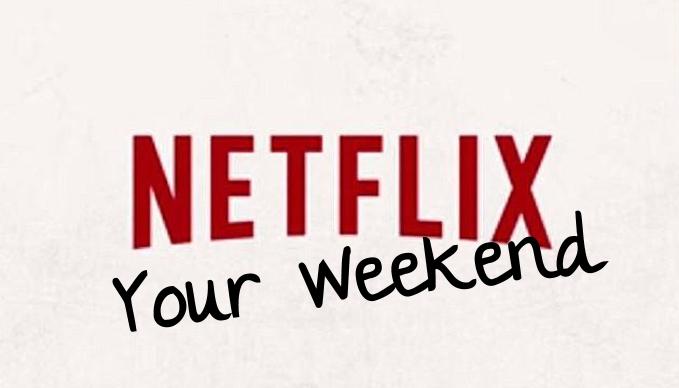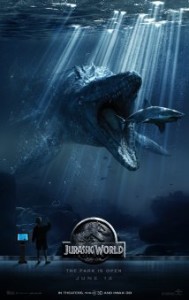 It’s been a little over 20 years since the original Jurassic Park left its monstrous footprint in cinematic history – and on many of our collective imaginations. Since then, movie-makers have tried repeatedly to recapture the sense of awe and terror the original inspired in us, though with little success – both The Lost World and Jurassic Park III were pretty abominable.
It’s been a little over 20 years since the original Jurassic Park left its monstrous footprint in cinematic history – and on many of our collective imaginations. Since then, movie-makers have tried repeatedly to recapture the sense of awe and terror the original inspired in us, though with little success – both The Lost World and Jurassic Park III were pretty abominable.
Jurassic World hopes to change that with the rallying cry “More teeth!” (Seriously, that’s the unofficial tagline of the film, uttered by at least 4 different characters). If the box office numbers are any indication, it’s well on its way. After its first weekend, the film now sports highest-grossing opening weekend of all time, beating previous record-holders The Avengers (U.S., 2012) and Harry Potter and the Deathly Hallows, Pt. 2 (2011, International), for a combined $524.1 million. Cue the dinosaur jokes.
With Jurassic World sequels planned before the first film even released, it actually doesn’t matter whether the film is any good. But we’re reviewing (and as someone once said, entertainment is never mindless), so: Is Jurassic World any good?
Yes, and really, really No.
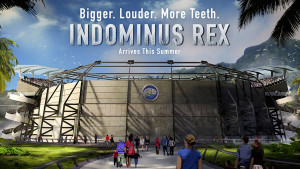 Jurassic World promised “More Teeth,” and “More Teeth” is most definitely what we get. The film is a spectacle of a dinosaur wonderland. It knows you paid money to see teeth, and works hard to deliver teeth in droves. Unfortunately, along the way, the film forgets that human characters matter, too. The plot is riddled with clichés, poorly concealed revisions and “twists” as predictable as the inevitable dinosaur mayhem.
Jurassic World promised “More Teeth,” and “More Teeth” is most definitely what we get. The film is a spectacle of a dinosaur wonderland. It knows you paid money to see teeth, and works hard to deliver teeth in droves. Unfortunately, along the way, the film forgets that human characters matter, too. The plot is riddled with clichés, poorly concealed revisions and “twists” as predictable as the inevitable dinosaur mayhem.
But hey, we didn’t plop down our hard-earned bucks for plot. We came for teeth! So how ‘bout those Dinos?
The dinosaurs in Jurassic World have never been more fun. The raptors are thrilling. There are (finally!) Pterodactyls Pteradons and Ankylosauruses and Stegosauruses. (There might have been Stegos in III. I have blocked that film out, along with X-Men: The Last Stand and Spider-Man III.) The giant aquatic Mosasaurus is still cool even though you saw it 1,000 times in the previews.
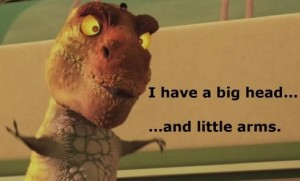 And the T-Rex, king of the terrible lizards. Poor T-Rex has suffered mightily thanks to the merciless mockery of pop culture. We get it… the poor girl has short arms. Thanks Meet the Robinsons and T-Rex Trying. (No, seriously… Thank you. I laugh super hard every time I see your stuff.) How can T-Rex hope to recapture the terrifying splendor of her long-gone glory days – the early 90s, not the late Jurassic? Fear not! Jurassic World fixed T-Rex by creating a dino that has giant arms and can camouflage (and… for some reason… regulate its own body temperature). The Indominus Rex is a half-T-Rex, big, scary-smart dinosaur hybrid, created to be a bio-weapon disguised as a theme park attraction, and it more than serves to create big thrills and some pretty visceral terror as it escapes and… terrorizes the park.
And the T-Rex, king of the terrible lizards. Poor T-Rex has suffered mightily thanks to the merciless mockery of pop culture. We get it… the poor girl has short arms. Thanks Meet the Robinsons and T-Rex Trying. (No, seriously… Thank you. I laugh super hard every time I see your stuff.) How can T-Rex hope to recapture the terrifying splendor of her long-gone glory days – the early 90s, not the late Jurassic? Fear not! Jurassic World fixed T-Rex by creating a dino that has giant arms and can camouflage (and… for some reason… regulate its own body temperature). The Indominus Rex is a half-T-Rex, big, scary-smart dinosaur hybrid, created to be a bio-weapon disguised as a theme park attraction, and it more than serves to create big thrills and some pretty visceral terror as it escapes and… terrorizes the park.
What’s the other half, you ask? In the least surprising move in cinema history, the big reveal in Act 3 – to no one’s surprise – is that Indominus Rex’s other half is Velociraptor. Given that Jurassic Park’s two coolest dinos are the T-Rex and the raptors, there was literally no other option.
The final fight between the Indominus Rex, the T-Rex, and Owen’s (Chris Pratt) trained raptors was awesome. Side note: a lot of people were worried about the trained raptors. They’re not trained, exactly. They work thematically and they’re much more interesting as bridge between dinos and humans than the dino-human hybrids originally planned for the film. As great as the pervious dino-fight scenes were, this one takes the cake. It’s crazy, and it builds well. We asked for more teeth, and this fight delivers in droves.
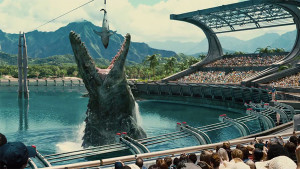 That said, the fight also points to some of the deeper structural problems that plague Jurassic World. Watching the scene, it’s almost impossible to believe the film wasn’t written by committee. When Owen first meets the Indominus Rex, he warns that because it’s been raised in isolation, it’s probably a bit crazy. In what sure felt like some heavy foreshadowing, he ominously intoned that I-Rex’s only positive association is the crane they used to deliver her food. The crane looks exactly like the crane we’d just seen used to feed the mosasaurus, and the mosasaurus is the only animal in the park capable of dealing safely with the I-Rex (given that it’s confined to a giant salt tank).
That said, the fight also points to some of the deeper structural problems that plague Jurassic World. Watching the scene, it’s almost impossible to believe the film wasn’t written by committee. When Owen first meets the Indominus Rex, he warns that because it’s been raised in isolation, it’s probably a bit crazy. In what sure felt like some heavy foreshadowing, he ominously intoned that I-Rex’s only positive association is the crane they used to deliver her food. The crane looks exactly like the crane we’d just seen used to feed the mosasaurus, and the mosasaurus is the only animal in the park capable of dealing safely with the I-Rex (given that it’s confined to a giant salt tank).
Here is an artist’s recreation of the producers giving the screenwriter notes:
Producer: I see here in the third act, you have Owen and Claire use the fish crane to trick the I-Rex into getting eaten by the big shark-thing.
Writer: The Mosasaurus. Yes. It’s really the only dinosaur in the park that can take it out.
Producer: You’re telling me that you have a dinosaur that’s half-T-Rex and half-Velociraptor, and it’s just going to get eaten by a shark?
Writer: Well, it’s a Mosasaurus. But yes. It’s really the only thing that makes sense. We’ve already thrown about 50 human characters at it, plus a helicopter and shot it with a bazooka. It’s practically un-killable.
Producer: Why don’t you have it fight… wait for it… a T-Rex and the Velociraptors!
Writer: Uh… this thing is like 10 times as big as a Velociraptor. I don’t think they could hurt it. And it’s designed to be better than a T-Rex.
Producer: Right… but they fight it together, see? It’ll be huge.
Writer: So you don’t want the Mosasaurus at all? I sort of set up the whole movie to foreshadow that it would kill the Indominus Rex. That would mean a pretty major rewrite.
Producer: Okay fine. How ‘bout this: did you ever see Deep Blue Sea? When the shark ate Sam Jackson? Man that was scary. Why don’t you have the shark do that? Er, the… what’d you call it?
Writer: Mosasaurus?
Producer: Yeah. Have the shark do that.
I promise… the fight is so awesome you won’t even care… much.
The film’s biggest problem is its human characters. It’s like the screenwriter reached into a screenwriting drawer, grabbed a handful of tired cliches and tossed them at the page. The parents are getting divorced. Why? Doesn’t matter. Doesn’t affect the plot. The older brother is an angsty teenager. He couldn’t care less about dinosaurs (this is supposed to be a THEME, but it is so poorly executed it doesn’t work). The younger brother is a Nerd. He knows SCIENCE and is good at Video Games. And is obsessed with Dinosaurs. None of this actually matters, nor does it pay off in any significant way – foreshadowing really isn’t Jurassic World’s strong suit.
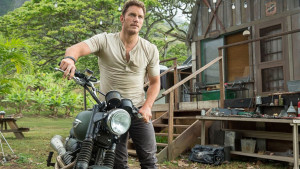 Chris Pratt’s Owen is a Manly Man of Man-tastic Mannisms. He’s so manly, he stinks (actually a thing said in the movie to his character). He is good at all the things, is terribly good looking and irresistibly charming. He is so perfect, in fact, that his character is completely static from beginning to end. Pratt owns this character – he’s just plain delightful to watch, but seriously. He’s every male cliché you can imagine.
Chris Pratt’s Owen is a Manly Man of Man-tastic Mannisms. He’s so manly, he stinks (actually a thing said in the movie to his character). He is good at all the things, is terribly good looking and irresistibly charming. He is so perfect, in fact, that his character is completely static from beginning to end. Pratt owns this character – he’s just plain delightful to watch, but seriously. He’s every male cliché you can imagine.
Bryce Dallas Howard’s Claire, on the other hand, is a mess, particularly in the third act. Her character arc is essentially “Uptight Career Woman sacrificing every maternal instinct and has become the un-woman in her quest to climb the corporate ladder.” She must learn how to “Loosen Up” and “Have Fun” and “Care About Kids” and “Want to Be Married.” Fortunately, Owen is on hand to rescue her from Feminism!
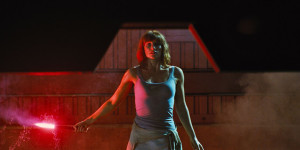 Fair is fair – Claire becomes much more tolerable as the film progresses. In Act Two she holds her own against Owen, and by Act Three is actively kicking butt – I was shocked (in a great way) when she went to get the T-Rex. Claire’s Act One fumblings are particularly clear when you compare her to John Hammond from the first film – he was both the successful businessman and a warm, kid-friendly figure. Why couldn’t Claire have been supremely competent and not be a complete waste when it came to her nephews? Why couldn’t she have greeted them warmly, known their ages, taken great care of them and promised to meet them for dinner? Change that one scene and her arc would’ve been much less problematic. The last thing we need in any film is the tired old “Women shouldn’t choose work over family or that makes them less human” cliché. Jurassic World would’ve been far better off without it.
Fair is fair – Claire becomes much more tolerable as the film progresses. In Act Two she holds her own against Owen, and by Act Three is actively kicking butt – I was shocked (in a great way) when she went to get the T-Rex. Claire’s Act One fumblings are particularly clear when you compare her to John Hammond from the first film – he was both the successful businessman and a warm, kid-friendly figure. Why couldn’t Claire have been supremely competent and not be a complete waste when it came to her nephews? Why couldn’t she have greeted them warmly, known their ages, taken great care of them and promised to meet them for dinner? Change that one scene and her arc would’ve been much less problematic. The last thing we need in any film is the tired old “Women shouldn’t choose work over family or that makes them less human” cliché. Jurassic World would’ve been far better off without it.
Thematically, Jurassic World departs from its predecessor in one particularly fascinating way: the original Jurassic Park was a morality play that warned against human hubris. In nearly every scene, Dr. Ian Malcolm warned that humans can’t control nature, that chaos rules and “Life finds a way.”
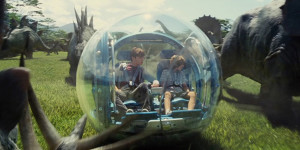 In Jurassic World, however, science has conquered nature to the extent that dinosaurs are completely safe amusements – toddlers are riding Triceratops, and so many people gather to see T-Rex eat a goat that one of the central scares of the original film is hidden behind the press of the customers. That’s no accident. As the two boys arrive on Isla Nubar and race to see the park, the iconic score of the first film swells to greet them. Flashbacks of that first moment when Dr. Alan Grant sees living dinosaurs chase the music as it crescendos, only to reveal a fully-functioning park. The wonder of Jurassic Park has been replaced by the commercialism of Jurassic World. We soon hear Claire preparing to introduce “Verizon Wireless presents Indominus Rex” (and the Jake Johnson monologue that follows, of corporate-named dinosaurs is, pardon the pun, priceless).
In Jurassic World, however, science has conquered nature to the extent that dinosaurs are completely safe amusements – toddlers are riding Triceratops, and so many people gather to see T-Rex eat a goat that one of the central scares of the original film is hidden behind the press of the customers. That’s no accident. As the two boys arrive on Isla Nubar and race to see the park, the iconic score of the first film swells to greet them. Flashbacks of that first moment when Dr. Alan Grant sees living dinosaurs chase the music as it crescendos, only to reveal a fully-functioning park. The wonder of Jurassic Park has been replaced by the commercialism of Jurassic World. We soon hear Claire preparing to introduce “Verizon Wireless presents Indominus Rex” (and the Jake Johnson monologue that follows, of corporate-named dinosaurs is, pardon the pun, priceless).
As the film progresses and what plot there is unfolds, we learn the park is barely solvent, despite the fact that you can see live dinosaurs there. As with anything else, people get bored, forcing the park to quest eternally for “More Teeth”. That drive for new exhibits pushes the park to create brand new dinos like the I-Rex. Ultimately, it turns out InGen wants to sell the dinos to the military, and it’s Dr. Wu’s predator modifications to the I-Rex (the camouflage and temperature regulation) that allow it to escape.
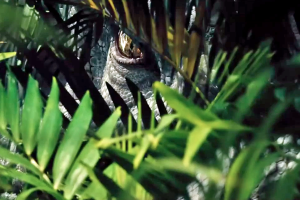 This is huge – in Jurassic World, life doesn’t find a way. It’s given the tools to create a way by human greed. In Jurassic Park, nature is a cold, cruel place that humanity can never hope to domesticate. Jurassic World suggests that we can domesticate nature (or, at least assume a posture of alpha-male domination over it, per Owen and his raptors). The danger to humanity is the intractable blindness of greed. (Sidebar: Wilson Fisk Vincent D’Onofrio is pretty good as the vaguely military guy from InGen who wants dino-weapons. But it’s almost hilarious how completely he refuses to acknowledge that the raptors aren’t “trained” the way he wants them to be.)
This is huge – in Jurassic World, life doesn’t find a way. It’s given the tools to create a way by human greed. In Jurassic Park, nature is a cold, cruel place that humanity can never hope to domesticate. Jurassic World suggests that we can domesticate nature (or, at least assume a posture of alpha-male domination over it, per Owen and his raptors). The danger to humanity is the intractable blindness of greed. (Sidebar: Wilson Fisk Vincent D’Onofrio is pretty good as the vaguely military guy from InGen who wants dino-weapons. But it’s almost hilarious how completely he refuses to acknowledge that the raptors aren’t “trained” the way he wants them to be.)
If there’s any moral to Jurassic World, it’s that we’re the architects of our own destruction, that the more power we unlock, the more dangerous we become to ourselves.
Ultimately, Jurassic World is basically just a film about dinosaurs fighting. It’s fun, but not much more, and that’s too bad – as self-aware as the film is (and it’s very self-aware), they should’ve realized we don’t just want “more teeth”. We’d love some well-developed characters and a plot that makes sense (or at the very least pays off in the Third Act what it promises in the First).
Of course, the monstrous box-office showing indicates most of us probably didn’t see Jurassic World for a moral. Apparently all we really wanted was “More Teeth.”

